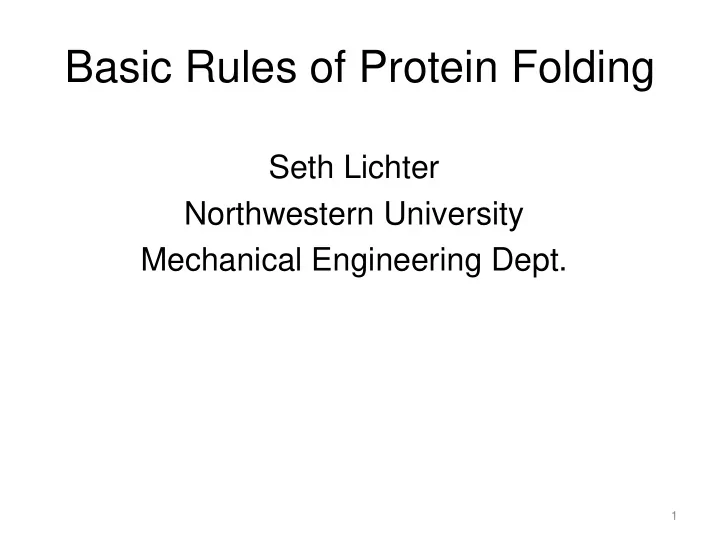

Basic Rules of Protein Folding Seth Lichter Northwestern University Mechanical Engineering Dept. 1
Basic Rules of Protein Folding Pengfei Diao Ashlie Martini Seth Lichter 2
3
4
5
6
7
8
9
10
http://www.thecephalopodpage.org/ 11
12
13
14
15
16 H.-Y. Wang, UCSC
17 Kinosita Lab
18 Kinosita Lab
19 Junge Lab
20
21 Jmol
22 Jmol
23 Jmol
24 Jmol
alpha helix beta sheet C. Bearden, Rice University 25
26 Hydrogen bonds in alpha helices
27 Hydrogen bonds in beta sheets
28 M. Farabee, Estrella Mountain Community College
29
30
Protein synthesis M. Farabee, Estrella Mountain Community College 31
The protein folding problem 32
How do proteins fold? Given the amino acid sequence, predict the protein’s three-dimensional structure. 33
The protein folding problem Methods of study Molecular Dynamics simulations: All atom Ab initio other… Minimalistic models: Go Lattice 34
time S. Kmiecik and A. Kolinski, Biophys. J. (2007) 35
36 g
37 OK, interesting. Importance?
Misfolding leading to Alzheimer’s disease S.S. Sisodia & P.H. St George-Hyslop Nature Rev. Neurosci. (2002) 38
39 g
temperature Folding and misfolding mechanisms of the p53 DNA binding domain at physiological temperature JAMES S. BUTLER AND STEWART N. LOH Protein Science (2006), 15:2457-2465 A.J. Berk Oncogene (2005) 40
OK, interesting. Importance? Understanding and treating disease 41
42 Why Mechanical Engineers?
43
44
45 Sieve pump
46 Flow meter
Given the amino acid sequence, predict the protein’s three-dimensional structure. 47
Methods of study—Experimental Atomic force microscope Laser tweezers 48
unfolded folded C. Cecconi et al. Science (2005) 49
unfolded How can the Force vs. Extension curves during folding be predicted? folded C. Cecconi et al. Science (2005) 50
51 Two-state model
52 Rate of unfolding
53 Rate of folding
54 Unfolding & folding rates for F = 0
55 Rate of unfolding with Force F F
56 F Rate of folding with Force F
Folding times Fernandez & Li, Science (2005) 57
58 Individual Bond (IB) Model Folding Unfolding
59 Individual Bond (IB) Model Folding Unfolding
60 Individual Bond (IB) Model Folding Unfolding
Individual Bond (IB) Model 1. Independent rate rule 61
Individual Bond (IB) Model 1. Independent rate rule 2. Exterior length rule 62
Individual Bond (IB) Model 1. Independent rate rule 2. Exterior length rule 3. Interior force rule F = 0 63
Individual Bond (IB) Model Folding Unfolding 1. Independent rate rule 2. Exterior length rule 3. Interior force rule 64
just the tether tether + protein C. Ceconi et al. Science (2005) 65
Experiments (Cecconi et al.) Individual Bond Model tether + protein just the tether 66
23 24 25 26 27 28 29 30 31 32 Folded protein: Sequence distance = 6 4 2 23 24 25 26 27 28 31 30 29 2 3 9 9 8 9 70 7 9 6 9 5 9 94 67
68
69 5 9 At zero force… 5
70 5 9 5 9 At zero force… 5 5
71 5 9 5 9 At zero force… 5 5
72
73 F 5 9 5 9 For Force = 0 5 X f 5 F
74 F 5 9 3 8 For Force = 0 X f 78 X f 4 2 X f 6 1 5 F
75 F 5 9 5 9 3 8 3 8 For Force = 0 8 X f 7 7 8 X f X f 2 4 2 4 X f 16 6 1 5 5 F
76 F 5 9 5 9 3 8 3 8 For Force = 0 X f 78 78 X f X f 4 4 2 2 X f 16 6 1 5 5 F
77 ~ X f
Two-state model Experiment (ubiquitin, Fernandez & Li) Individual Bond Model 78
Individual Bond (IB) Model Results: Folding times Extension vs. force 79
Individual Bond (IB) Model Results: The effect of force on the folding pathway 80
Proteins are complex mechanisms, which fold into different types of structural elements and machines. Proteins self assemble. Errors in self-assembly lead to disease. Understanding protein folding can lead to: therapies… nanoscale devices. 81
Protein folding is not understood. The two-state model does not fit with observation. New minimalistic models help us understand folding. The IB Model shows that features of folding are due to simple one-dimensional rules: 1. Independent rate rule Folding pathway 2. Exterior length rule 3. Interior force rule Extension vs. force Folding times 82
83 Questions & Answers
84 Protein Data Bank
Recommend
More recommend